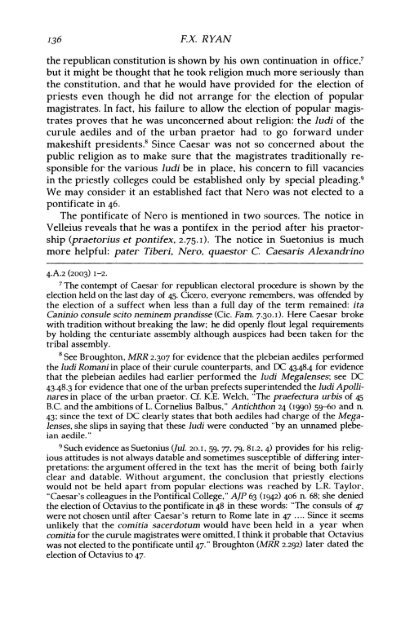MOUSEION - Memorial University of Newfoundland
MOUSEION - Memorial University of Newfoundland
MOUSEION - Memorial University of Newfoundland
Create successful ePaper yourself
Turn your PDF publications into a flip-book with our unique Google optimized e-Paper software.
136 F.x. RYAN<br />
the republican constitution is shown by his own continuation in <strong>of</strong>fice. 7<br />
but it might be thought that he took religion much more seriously than<br />
the constitution. and that he would have provided for the election <strong>of</strong><br />
priests even though he did not arrange for the election <strong>of</strong> popular<br />
magistrates. In fact. his failure to allow the election <strong>of</strong> popular magistrates<br />
proves that he was unconcerned about religion: the Judi <strong>of</strong> the<br />
curule aediles and <strong>of</strong> the urban praetor had to go forward under<br />
makeshift presidents. 8 Since Caesar was not so concerned about the<br />
public religion as to make sure that the magistrates traditionally responsible<br />
for the various Judi be in place. his concern to fill vacancies<br />
in the priestly colleges could be established only by special pleading. 9<br />
We may consider it an established fact that Nero was not elected to a<br />
pontificate in 46.<br />
The pontificate <strong>of</strong> Nero is mentioned in two sources. The notice in<br />
Velleius reveals that he was a pontifex in the period after his praetorship<br />
(praetorius et pontifex. 2.75. r). The notice in Suetonius is much<br />
more helpful: pater Tiberi. Nero. quaestor C. Caesaris AJexandrino<br />
4.A.2 (2003) 1-2.<br />
7 The contempt <strong>of</strong> Caesar for republican electoral procedure is shown by the<br />
election held on the last day <strong>of</strong> 45. Cicero, everyone remembers, was <strong>of</strong>fended by<br />
the election <strong>of</strong> a suffect when less than a full day <strong>of</strong> the term remained: ita<br />
Caninio consuJe scito neminem prandisse (Cic. Fam. 7.30.1). Here Caesar broke<br />
with tradition without breaking the law; he did openly flout legal requirements<br />
by holding the centuriate assembly although auspices had been taken for the<br />
tribal assembly.<br />
8 See Broughton. MRR 2.307 for evidence that the plebeian aediles performed<br />
the Judi Romani in place <strong>of</strong> their curule counterparts, and OC 43484 for evidence<br />
that the plebeian aediles had earlier performed the Judi MegaJenses; see OC<br />
43.48.3 for evidence that one <strong>of</strong> the urban prefects superintended the Judi Apollinares<br />
in place <strong>of</strong> the urban praetor. a. KE. Welch, "The praefectura urbis <strong>of</strong> 45<br />
B.C. and the ambitions <strong>of</strong> L. Cornelius Balbus," Antichthon 24 (1990) 59-60 and n<br />
43: since the text <strong>of</strong> DC clearly states that both aediles had charge <strong>of</strong> the Mega<br />
Jenses. she slips in saying that these Judi were conducted "by an unnamed plebeian<br />
aedile."<br />
9 Such evidence as Suetonius (Jul. 20.1,59,77,79,81.2,4) provides for his religious<br />
attitudes is not always datable and sometimes susceptible <strong>of</strong> differing interpretations:<br />
the argument <strong>of</strong>fered in the text has the merit <strong>of</strong> being both fairly<br />
clear and datable. Without argument, the conclusion that priestly elections<br />
would not be held apart from popular elections was reached by L.R. Taylor,<br />
"Caesar's colleagues in the Pontifical College," AJP 63 (1942) 406 n. 68; she denied<br />
the election <strong>of</strong> Octavius to the pontificate in 48 in these words: "The consuls <strong>of</strong> 47<br />
were not chosen until after Caesar's return to Rome late in 47 .... Since it seems<br />
unlikely that the comitia sacerdotum would have been held in a year when<br />
comitia for the curule magistrates were omitted, I think it probable that Octavius<br />
was not elected to the pontificate until 47. " Broughton (MRR 2.292) later dated the<br />
election <strong>of</strong> Octavius to 47.

















